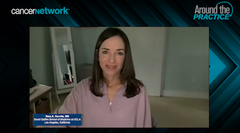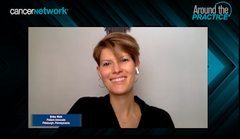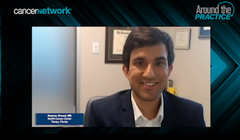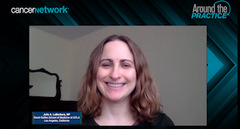
Common Symptoms Associated With HER2+ Metastatic Breast Cancer
Patient advocate Erika Rich compares initial symptoms that prompted her to seek a medical evaluation with symptoms commonly associated with HER2-positive metastatic breast cancer.
Episodes in this series

Sara A. Hurvitz, MD: Let’s talk about how these patients tend to present. Julia, can you tell me how a patient with breast cancer that’s metastatic typically presents?
Julia LaBarbera, NP: Most patients tend to feel a mass in their breast or armpit area that triggers screening, mammogram, or ultrasound of some sort. If there’s concern about the cancer being in the lymph nodes, then we’ll often do a full-body scan. At that point, in metastatic cancers we’ll see cancer elsewhere in the body—the lymph nodes, liver, bones, or even brain. That may come as a surprise to some women. They might not necessarily have symptoms that reflect the cancer being outside the breast area. However, some women might have long-standing back pain that’s not improving or a persistent cough that hasn’t been going away. There may or may not be symptoms that the cancer has spread.
Sara A. Hurvitz, MD: It’s very heterogeneous, as you’ve indicated. Some patients will present with metastatic disease having had a history of early stage disease. Some will present with a mass in their breast and then be found to have what we call de novo metastatic disease, which is stage IV breast cancer at the initial presentation. As our therapies for HER2 [human epidermal growth factor receptor]–positive, early stage disease have accelerated and improved the chances of not having cancer return, the rates of de novo metastatic disease or the proportion of de novo metastatic disease has gone up for HER2+ subtype. Erika, if you could share your story with us, it would be helpful to understand the signs and symptoms that led you to seek medical attention.
Erika Rich: I was very young when I was diagnosed—25 years old. I was extremely healthy. I was doing yoga, and I had a gluten-free vegan diet, so it did take me longer to make my way to the doctor because I didn’t think someone my age and with my health status could get diagnosed. I started noticing discharge from my nipple, and it wasn’t until that turned into a pretty large lump in my breast—probably 6 to 8 months later—that I made my way to the doctor. At the time, listening to you both talk, I knew I had metastasis from consistent back pain and things. I was diagnosed de novo when I did go in and finally get screening, testing, and biopsies done.
Sara A. Hurvitz, MD: You were so young when you were diagnosed. You still are very young. It’s not on the top of someone’s mind, I would imagine. When you notice a breast symptom, cancer isn’t the first thing you think of when you’re in your 20s. I imagine that probably led to you not seeking medical attention, maybe as soon as you would if you were 50 with this new symptom. Is that right?
Erika Rich: Yes, that’s correct. I was doing yoga. I was gaining a little weight at the time, and there were things that were pointing to get me to the doctor. But outside that, I never typically went to the doctor, so it did take me a little longer.
Transcript edited for clarity.
Newsletter
Stay up to date on recent advances in the multidisciplinary approach to cancer.





































